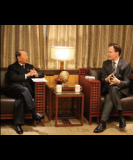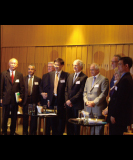You are browsing > Service Trade > Trade Info
WTO report shows slowdown in G20 trade restrictions as COVID-19 impacts world economyWTO
The WTO’s latest Trade Monitoring Report on G20 trade measures shows a slowdown in the number and coverage of trade-restrictive and trade-facilitating measures on goods implemented by G20 countries between mid-May and mid-October 2020, primarily as a result of the sharp decline in overall global trade since the COVID-19 outbreak. The report also documents numerous trade-facilitating and support measures introduced by G20 economies in response to the economic downturn in order to prepare the ground for a strong economic recovery.
Joint Summary on G20 Trade and Investment Measures (OECD/WTO/UNCTAD)
WTO Report on G20 Trade Measures (mid-May to mid-October 2020)
Summary and Status of G20 trade and trade-related measures since October 2008 (Excel Format)
OECD/UNCTAD Report on G20 Investment Measures.
This 24th WTO Trade Monitoring Report on G20 trade measures was prepared against the backdrop of the COVID-19 pandemic and the human, social and economic toll it continues to exact. While the previous report, issued in June 2020, captured only the very early effects of the COVID-19 pandemic, the new report reflects more fully the impact the global health crisis has had on trade and trade policy.
Although world trade had already been slowing before the pandemic, merchandise exports in nominal USD terms was down 21 per cent in the second quarter of 2020 compared to the previous year, while commercial services exports was down 30 per cent.
The trade coverage of ‘regular’ import-facilitating and import-restrictive measures introduced during the five-month period, that is those unrelated to the COVID-19 pandemic, dropped to USD 36.8 billion (down from USD 735.9 billion in the previous period) and USD 42.9 billion (down from USD 417.5 billion) respectively. This was a function of the sharp decline in overall global trade flows, the diversion of governments' attention towards pandemic response, and relative stasis in major bilateral trade tensions that had elevated both sets of figures in earlier reporting periods — as well as a general commitment to keep trade flowing.
At the same time, trade measures directly tied to the pandemic covered a significant amount of global trade. COVID-19 related trade-facilitating measures on goods implemented since January covered trade worth an estimated USD 155 billion, while pandemic-related trade-restrictive measures — most of which were export controls — covered trade worth USD 111 billion. Of the 133 COVID-19 trade and trade-related measures recorded for G20 economies since the outbreak of the pandemic, 63 per cent were of a trade-facilitating nature and 37 per cent were trade restrictive.
Almost three out of every ten COVID-19 restrictive measures on goods taken by G20 economies had been repealed by mid-October. Most of them were export restrictions. In the services sectors heavily impacted by the pandemic, most of the 68 COVID-19 related measures adopted by G20 economies appeared to be trade facilitating.
Over 400 support measures in direct response to the pandemic and collectively worth several trillion dollars were put in place by G20 economies up until mid-October. These emergency support measures are central to governments’ strategies to address the pandemic-induced economic downturn and lay the groundwork for a swift recovery of output and trade, and appear to be temporary in nature.
WTO Secretariat estimates of the accumulated stockpile of import restrictions implemented since 2009 suggest that 10.4 per cent of G20 goods imports (USD 1.5 trillion out of a total USD 14.6 trillion of G20 imports) are affected by import restrictions that are still in force after being put in place by G20 economies.
Commenting on the report, WTO Deputy Director-General Yonov Frederick Agah said:
“COVID-19 has resulted in an almost unprecedented drop in economic output and trade. Trade will play a fundamental role in making a strong economic recovery possible, so it is encouraging to see the general commitment by G20 countries to keep trade flowing.
“Along with open markets, the fiscal and monetary support put in place by G20 economies will be central to addressing the downturn and laying the foundations for a stronger, more inclusive and sustainable global economy. Transparency and cooperation can help prevent today’s much-needed stimulus from turning into fodder for tomorrow’s trade tensions. Members have already used WTO committees to discuss aspects of each other’s pandemic-related support policies.
“While the number of new trade-restricting measures was modest, the fact remains that restrictions that have accumulated since 2009 are weighing on over a tenth of G20 imports — 8% of global imports. Now more than ever, G20 governments must continue to work together.”
The report also shows that G20 economies continued to use WTO bodies to address trade concerns. Although fewer meetings took place during the review period as a result of the pandemic, several of these concerns had been raised in the past, appearing to indicate persistent and unresolved issues.
In addition, many intellectual property (IP) measures introduced during the review period aimed at facilitating access to COVID-19-related health technologies. G20 economies continued to fine-tune their domestic IP frameworks, including relaxing procedural requirements and extending deadlines for administrative IP matters in response to the pandemic.
The WTO trade monitoring reports have been prepared by the WTO Secretariat since 2009. G20 members are: Argentina; Australia; Brazil; Canada; China; the European Union; France; Germany; India; Indonesia; Italy; Japan; the Republic of Korea; Mexico; the Russian Federation; the Kingdom of Saudi Arabia; South Africa; Turkey; the United Kingdom; and the United States.









